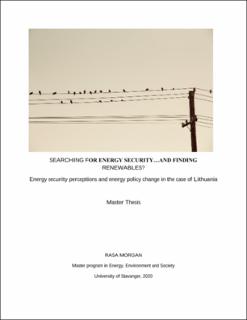| dc.description.abstract | Most modern societies face pressure to ensure energy security and to decarbonise their economies. The case of Lithuania provides an example of how an EU “energy island”, highly dependent on Russian energy resources, progressed from pro-nuclear to anti-nuclear and then to renewable energy advocate in the last decade and developed its energy policy accordingly. Based on the constructivist approach this thesis focuses on energy security perceptions through the lens of threats/vulnerabilities as political constructs, combined with the revised Copenhagen Securitization School and answers two research questions: first, how did policy makers perceive energy security in the period of 2009-2019, and second, what drivers enabled the energy policy shift from nuclear to renewable energy?
Discourse analysis examined the subjective aspects of energy security perceptions in the Lithuanian power context and revealed that: energy was a highly politicised and securitized issue, and energy independence as a key condition for energy security was the dominant narrative in the energy security discourse. Process tracing analysis demonstrated that environmental concerns, EU membership and indefinite deferral of the Visaginas nuclear power plant influenced renewables deployment, however, energy security was the biggest enabler of rapid renewables acceleration in the latest strategy. It also revealed the non-linear relationship between energy security and renewables, therefore the initial hypothesis has been re-formulated: a higher degree of perceived energy security was the main driver for the strategy based on renewables.
Overall it is concluded that energy security perceptions are significant in shaping energy policy. At the same time, they are shaped by historical past, identities and perceptions of Russia as a dangerous “Other”. Lithuania is entering a new, renewable energy world, which faces different challenges. Critical analysis of renewables as contributors to energy security is urgently needed. | en_US |
